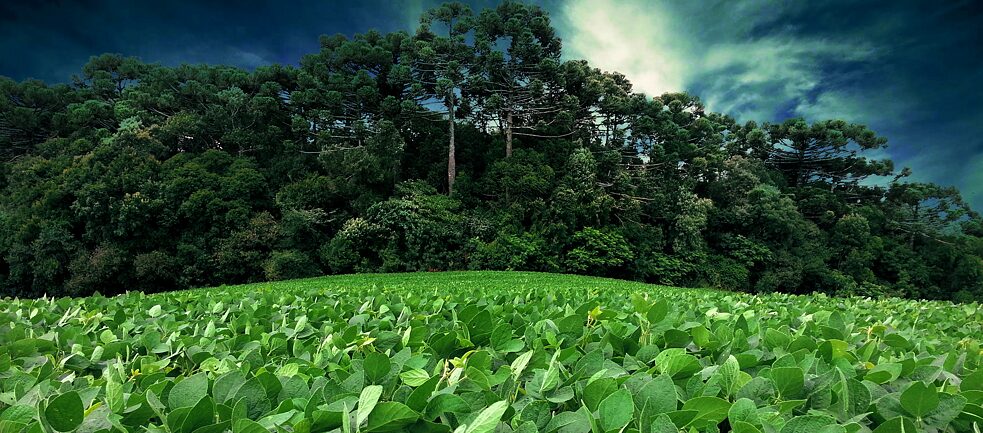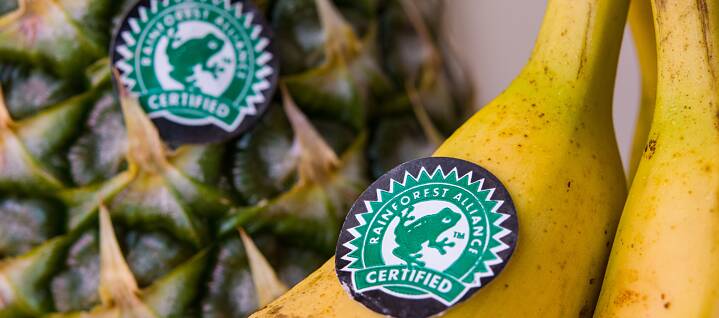Greenwashing
Green Lies: Trust Is Bad, Control Is better

Greenwashing not only dupes consumers; it also stands in the way of real change. Ecological promises and voluntary certifications have long led the public to believe that the global economy is getting greener all on its own. But that is simply not the case. A new law is being passed to fix it.
By Kathrin Hartmann
“Save the planet” cans of dog food from Nestlé’s Terra Canis brand proclaim: For every can of meat sold from this particular line, a donation is meant to go to reforestation, making solar-powered lights in Africa or cleaning up the oceans. The more cans that are sold, the more the planet gets saved – at least that is the impression given.
What is not included on the meaty dog-meal packaging: It is precisely the immense and globally growing consumption of meat that is playing a key part in the destruction of the forests. The need for land to grow cattle feed like soybeans, frequently as climate-destructive monocultures, is one factor driving deforestation. According to the UN Food and Agriculture Organization (FAO), this is why livestock farming accounts for around 14.5 percent of all global greenhouse gas emissions.
This strategy employed by corporations like Nestlé is called greenwashing, where companies try to hide their environmentally and climate-damaging core business under a green cloak. A variety of instruments is used, but they all work the same way: The company’s environmental commitment is overemphasized in marketing using noble words and images – but the central activities, as destructive as they are profitable, are not mentioned. Consumers are left with the fine feeling of a clean conscience. This practice includes grand-sounding promises to reduce CO2. Even some oil, automobile, concrete and coal companies have promised “zero emissions” by 2050, indicating that their industries will no longer be emitting greenhouse gases by 2050. They do not want to give up their core business with finite raw materials though, so they are relying on carbon offsetting instead, such as through reforestation. This will not prevent the environmental damage caused by the extraction of fossil fuels. And nine out of ten reforestation projects fail.

Shell has declared its goal to be carbon neutral by 2050 – but the company does not want to give up its oil and gas activities just yet and is instead relying on offsetting and carbon sinks. Greenpeace activists demonstrate against fossil fuel extraction with “Fossil free revolution” posters in Glasgow in October 2021. | Photo (detail): © picture alliance/ASSOCIATED PRESS/Peter Dejong
The Empty Promises of Eco-certifications
Greenwashing has many faces. Some corporations like Nestlé employ fundraising campaigns, while others launch their own environmental projects or work with nature conservation organisations. Private-sector and voluntary certification systems, like the ones in place for raw materials like wood, palm oil, soy, cotton, cocoa, coffee and tea, have become an essential greenwashing tool as well.
These sustainability seals not only inspire consumer confidence – non-governmental organisations (NGOs) and even some segments of the government have so far relied on them to steer the economy onto a sustainable path. Proponents argue that destruction could be slowed by using such initiatives to persuade the corporations causing major environmental damage to voluntarily comply with environmental and social standards. So far those, these predictions have not come true. Certification initiatives are frequently come under fire because it turns out that the products they certify are either not produced sustainably or not sustainably enough.

Private sector or voluntary certification schemes have become an essential greenwashing tool. | Photo (detail): © picture alliance/ZB/Patrick Pleul
Voluntary Due Diligence Is Not Enough
A few years ago, frozen food company Iglo advertised that it would donate a couple cents from every pack of fishfingers sold to a marine conservation project run by the WWF, a wilderness conservation NGO. Today, Iglo sells fish marked with the MSC sustainability seal. Twelve percent of fish products sold worldwide are emblazoned with the Marine Stewardship Council label. But the initiative has been subject to criticism for years: In 2012, the Kiel-based Geomar Institute showed that one-third of MSC-certified fish comes from overfished stocks. According to a recent report by French NGO BLOOM, destructive fishing methods – like trawling by large, industrial vessels – are used in 83 percent of MSC-certified catches. And the MSC label is not an isolated case.
In March 2021, Greenpeace released the “Destruction: Certified” study. It looked at nine major commodity certification schemes, including the Roundtable on Sustainable Palm Oil (RSPO), the Roundtable on Responsible Soy (RTRS), and the Rainforest Alliance and the Forest Stewardship Council (FSC). The study concluded that these schemes were “weak tools to address global forest and ecosystem destruction.” Most of the labels studied allowed destructive companies to continue with business as usual.

Soybeans now grow where the rainforest once stood: the soybean harvest in Mato Grosso in Brazil. | Photo (detail): © Adobe
This is not always down to weak standards, and poor implementation and lack of transparency are also common contributing factors. The certification system committees and boards are often dominated by precisely those corporations that are dependent on or profit from raw material extraction. The Roundtable on Sustainable Palm Oil, for example, has 1,934 full members, including 973 consumer goods and trading companies, 887 palm oil companies and 15 banks – but only 50 NGOs. Accordingly, there are also no or few effective sanctions when members violate the – frequently weak – guidelines they themselves helped put in place. Organic food certification was not included in the study, which Greenpeace notes is well regulated and much more trustworthy. Although also open to criticism, the organic seal is governmental, and there are binding standards as well as controls and sanctions imposed on violators.
New Legislation Instead Of Greenwashing
Voluntary commitments by companies have not led to significant changes in the past 20 years. German policymakers have recognised the problem and are now looking for ways to hold corporations legally accountable. Under intense pressure from civil society, the German government passed a supply chain act in summer 2021 designed to force companies to fulfil their human rights due diligence obligations along their supply chains.
Industry lobby groups may have succeeded in substantially weakening the proposed bill: Instead of applying to companies with 250 or more employees, it initially applies only to those with at least 3,000 employees; it does not contain any civil liability and only impacts direct suppliers. They were, however, unable to prevent it. The time when voluntary commitments are considered good enough will soon run out.